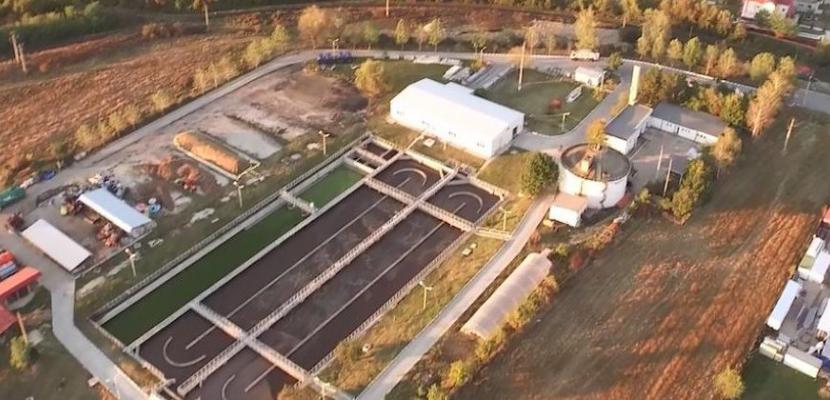Image

Composting municipal wastewater sludge and garden waste – pilot project
Published on 07 November 2018

Romania
Bucureşti-Ilfov
This is the good practice's implementation level. It can be national, regional or local.
About this good practice
The pilot composting project was introduced in 2016 as a solution to recover nutrients from the sewerage sludge, as well as avoiding landfilling costs for sludge and garden waste. It is an example of bio-based circular economy where nutrients are recycled back to the soil. A membrane technology ensures optimum conditions for speeding the composting process, high temperature to destroy pathogens, production of good quality compost.
Park waste is shredded and mixed with sludge in a certain proportion (3 parts green waste: 1 part sludge) using a frontal loader. 200 cubic meter heaps are formed with aeration tubes at the base and temperature sensors are inserted and connected to a computer, so the process is partly automated. The heap is covered with the GORE® Cover semi-permeable membrane, to prevent moisture and heat loss, avoid release of unpleasant smells and leaching by rainwater. By using this technology, composting time is reduced from 6 months to 8 weeks.
In the first phase the technology was demonstrated and the resulting compost was applied on public land (green areas).
In the second phase, trial plots were set up to study the effect of the compost on different crops. It is estimated that in a couple of years the company will be able to bring a range of products on the market, namely different types of compost for flowers, vegetables etc.
The main stakeholders are the public service company and Mioveni municipality.
Park waste is shredded and mixed with sludge in a certain proportion (3 parts green waste: 1 part sludge) using a frontal loader. 200 cubic meter heaps are formed with aeration tubes at the base and temperature sensors are inserted and connected to a computer, so the process is partly automated. The heap is covered with the GORE® Cover semi-permeable membrane, to prevent moisture and heat loss, avoid release of unpleasant smells and leaching by rainwater. By using this technology, composting time is reduced from 6 months to 8 weeks.
In the first phase the technology was demonstrated and the resulting compost was applied on public land (green areas).
In the second phase, trial plots were set up to study the effect of the compost on different crops. It is estimated that in a couple of years the company will be able to bring a range of products on the market, namely different types of compost for flowers, vegetables etc.
The main stakeholders are the public service company and Mioveni municipality.
Resources needed
The total investment was around 150.000 € from the company’s own funds for the membrane and composting equipment. The project is operated by the company’s own employees.
Evidence of success
- Landfilling costs for sludge and park waste saved ~ 24.000 €/ year
- Large amounts of biowaste are no longer landfilled and are returned to green areas (circularity)
- Reduced storage time on the platform / less storage capacity needed using the membrane technology
- High quality compost, tested for pathogens and pollutants
- Expected revenues in the coming years from compost commercialisation
- Potential for training, sharing knowledge and creating new “green jobs”
- Large amounts of biowaste are no longer landfilled and are returned to green areas (circularity)
- Reduced storage time on the platform / less storage capacity needed using the membrane technology
- High quality compost, tested for pathogens and pollutants
- Expected revenues in the coming years from compost commercialisation
- Potential for training, sharing knowledge and creating new “green jobs”
Potential for learning or transfer
This good practice could be applied with good results by municipalities operating wastewater treatment plants with advanced biological treatment where park waste is also available. In 2017 Mioveni public service company established a training centre for staff involved in composting. In the first phase, the training services were destined for the company’s own staff, but it is meant to share the knowledge by offering composting know-how to other stakeholders who are interested in replicating the project. The company is working together with the Romanian Compost Association, seeking to provide also the legal framework for developing commercial products, thus turning biowaste into profit.
Further information
Website
Good practice owner
You can contact the good practice owner below for more detailed information.
Organisation
Municipal Services for Mioveni Community / Servicii Edilitare pentru Comunitate Mioveni

Romania
Sud-Muntenia
Contact
Director
